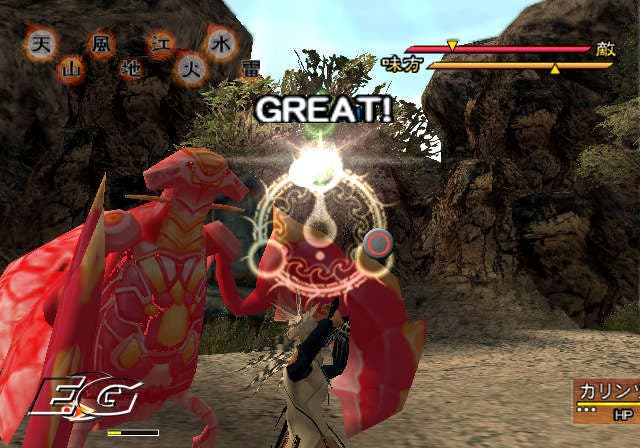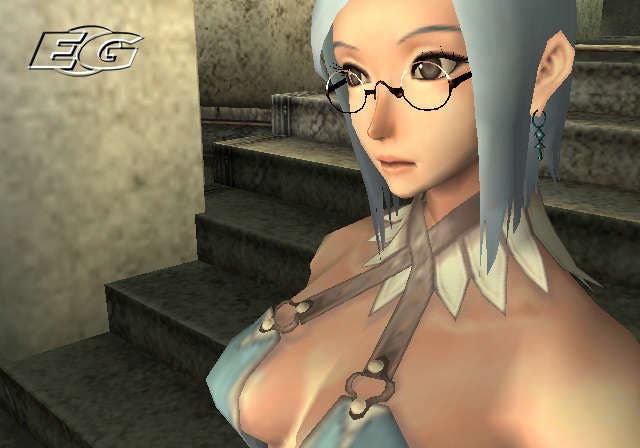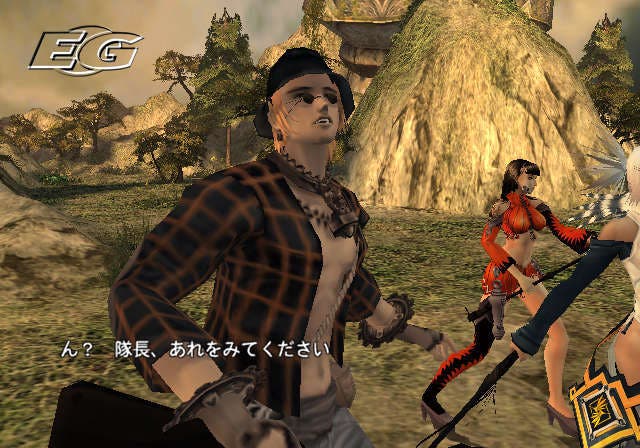Magna Carta: Tears of Blood
Cry me a river.
The Magna Carta, that historically crucial legal document that bound the power of an English Monarch by law so that today the Queen can’t just wee down your chimney or execute left-handed people willy-nilly, was signed off in 1215. To say that this, its namesake videogame, appears also to have been created 791 years ago would be a mostly unfair joke; but one just funny and true enough to make it worthwhile. After all, its developers live in Korea and that’s far enough away that they can’t punch us or anything.
Magna Carta Tears of Blood is an attempt to make something the rest of the world used to do before they mostly decided the whole idea was probably a pretty bad one and moved on. Maybe Softmax is just playing software top-trumps with Japan? Whatever - although this aims for Final Fantasy VIII, it mostly ends up just hitting the fan.
That’s not to say it’s not effective in its superficial imitation. The game opens as prettily and cut-scene-heavily as you might expect, but the flickering cracks between the jaggy polygonal walls and the awkwardly proportioned characters belie the difference in development budgets. Put it this way: Square-Enix could probably clear third world debt instead of making FFXIII; Softmax probably couldn't clear a credit card.

Still, a fleeting glance at the stationary game suggest a well-crafted and skilfully animated world. But, like so much with the game, when you move from the snapshot of form to the interactive reel of function, everything falls hopelessly apart. For example, the camera constantly locks its view, so navigating even the most uncomplicated hallway is a Herculean task of spatial displacement. Likewise the world is littered with doors that can’t be opened and paths that can’t be taken as the game shepherds you from narrative event to narrative event through its invisible corridors.
Those events fall within a story framework that promises much but delivers little. The plot centres on the tensions that arise when a native population is forced to live alongside settling colonists, a setting one might hope would give rise to themes of racism and prejudice in biting and incisive social commentary. Sadly, this is a videogame so all that potential is bundled into a sack, filled with bricks and dropped into the dark abyss in exchange for the usual meta-demon and icy-hearted queen antagonists.
The plot jumps with sub-Tarantino inelegance; never bothering to tie its loose ends tidily, or really make any real cohesive sense at all. Indeed, many of the micro dialogue sections seem to work against the macro narrative flow with you carrying out actions that are almost in direct contrast to what your team needs you to do. The classic RPG narrative trick of making your characters fight a key boss enemy far too strong for you in order to trigger a key introductory cut-scene are bizarrely undermined as you nearly pull off an overwhelming victory before your characters cry: "Quick! Run! They’re too strong for us!"

Random battles are predictably ubiquitous (the dash/detect move supposedly intended to reduce their frequency doesn’t really work) and, in contrast to Grandia 3’s breathtaking and innovative battle system, in Magna Carta your heart resignedly sags with each new encounter. This is not a subjective assessment - there are key, quantifiable reasons that the battle system is terrible. Positively, the game allows you free control over your three characters in the battlefield so it’s not just a simple menu war. This is coupled with a Shadow Hearts-style Simon-says button sequencing to trigger attacks and, on monitor, this sounds like a successful engagement of two ideas, but its ensuing marriage is broken by the decision to give your whole party just one battle gauge to determine when they get to attack.
Subsequently, when it fills, you’re only allowed to pick one solitary action from just one of your three characters. Additionally, the gauge doesn’t fill up while you’re anything other than stationary, spoiling what could have been a wonderfully fast and furious mechanic. When you finally get to attack you must press three buttons in quick succession - fail to do so and the process starts over; time it perfectly and your character duly spends a few seconds charging up the attack. This time delay was supposedly meant to add weight and tension to fights but, in reality, it just makes you pissed off and bored that it’s taking half an hour to kill three stupid beetles. This is further spoiled by an overly complicated and imbalanced chi system and the ever-spiteful camera that frequently positions your characters at the top of the screen at the start of fights so you have to run around searching for the enemies (all the while your attack gauge isn't moving because you are).
Outside of these adventurous tweaks to the formula the game slips into more traditionalist furrows. Your character has delightfully long smooth legs, sky silhouetting flowing hair, inviting wide eyes and gracefully pert breasts. But, he’s also a boy. Gender confusion is about as inventive as the character design gets and the conservative expression extends elsewhere. The game is keen on that most useless of RPG inventions, the appraisal, whereby many items you collect will have to be evaluated by a fortune-teller (why?) before you can use them a la Final fantasy XI. At save points you can give your colleagues ‘presents’ to make them respect you more and up your leadership ranking. This supposedly increases their affiliation with you as a leader and quickens your ATB gauge during battles but the benefits are marginal.

We’re bored of criticising games post-Dragon Quest VIII for having rubbish voice acting but Magna Carta deserves a mention not simply because here your ears will recoil far more violently than they have for a while, but also because the voice actors frequently misplace intonation and pile on over dramatisation by speaking really, really slowly adding to the already overly drawn out, tortoise-paced ambiance.
The Magna Carta aimed to limit the power of the king. Of RPGs with overblown production values, galaxy-wide spider-web narratives, protagonists of indistinct sex and abundantly irritating characterisation, Final Fantasy is still King and this chartered framework does absolutely nothing to impinge its power.

